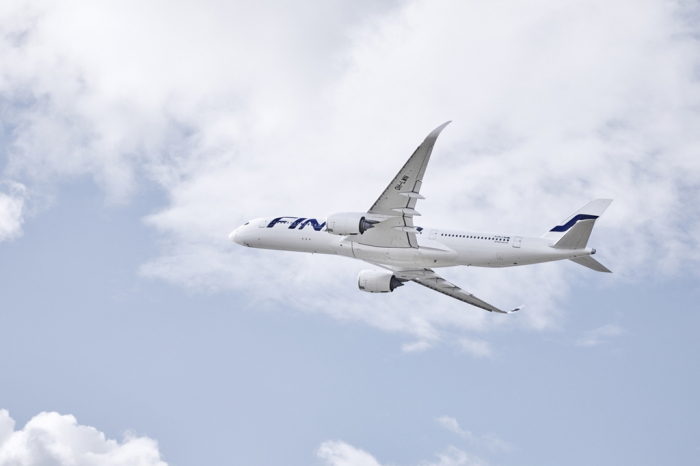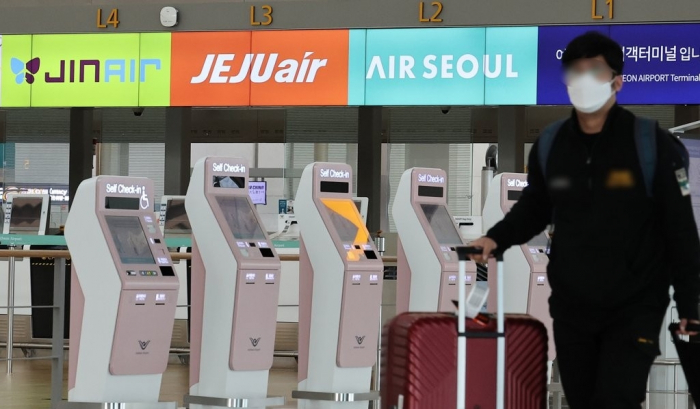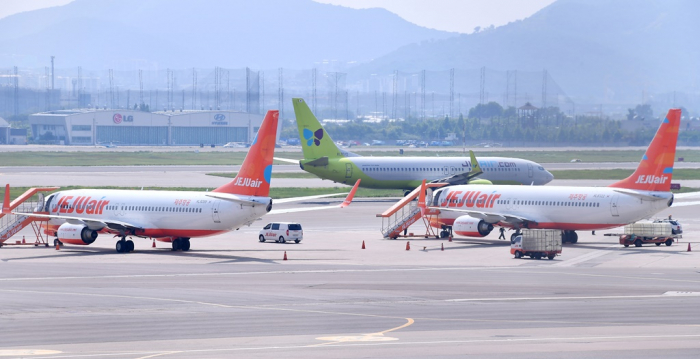Foreign airlines gnaw at Korean LCCs on international flight routes
Competition is set to get fierce as Korean Air, in the middle of acquiring Asiana, needs to give up some profitable routes
By Dec 20, 2022 (Gmt+09:00)
LG Chem to sell water filter business to Glenwood PE for $692 million


Kyobo Life poised to buy Japan’s SBI Group-owned savings bank


KT&G eyes overseas M&A after rejecting activist fund's offer


StockX in merger talks with Naver’s online reseller Kream


Mirae Asset to be named Korea Post’s core real estate fund operator



South Korea’s budget airlines are facing growing competition with foreign carriers on profitable international routes with the reopening of airways.
According to the Ministry of Land, Infrastructure and Transport, the number of passengers taking international flights in Korea reached 15.54 million in the first 11 months of the year. Of which, non-Korean airlines handled 5.75 million passengers, or 37% of the total.
The ratio of foreign airlines has increased by 4 percentage points from 33% in the same period of 2019 – before the outbreak of the COVID-19 pandemic.
Korea’s two full-service carriers – Korean Air Lines Co. and Asiana Airlines Inc. – accounted for 43.3% of international flights in the January-November period, up from 37.5% three years ago.
Low-cost carriers (LCCs), however, saw their share of the entire international flights involving Korean routes decrease to 19.7% from 29.6%.
The main routes of domestic LCCs are China, Japan and Southeast Asia, where aviation authorities were quick to ease pandemic-related regulations.

Korean regulators, however, were relatively late to allow local airlines to operate their international flights to the region, limiting their request for increased flights.
Their overseas rivals such as VietJet Air and Philippine Airlines have rapidly increased flights, including those to Seoul.
On long-haul routes such as the European line, even full-service domestic carriers – Korean Air and Asiana – have been slow in increasing their international flights.
By contrast, Lufthansa, the German flag carrier, has steadily increased its flights between Korea and European countries, targeting stopover passengers.
Finnair, Finland’s largest airline company, said on Monday it is increasing its Incheon-Helsinki flights to seven times a week from the current three. Finnair has also launched an eight-day tour package to Northern Europe in partnership with 11 Korean travel agencies.
TOUGHER COMPETITION IN 2023
Industry watchers said Korean LCCs and full-service carriers are set to face tougher competition with foreign airlines on Asian and other international routes.
Korean Air (KAL), the country’s flag carrier, is in discussions with foreign airlines over how to split some of its key routes with rivals to ease concerns over its proposed merger with Asiana Airlines.

Since Korean Air announced its 1.8 trillion won ($1.4 billion) takeover of Asiana in late 2020, the top Korean airline has received the go-ahead from nine authorities, including a conditional nod from Korea’s antitrust body.
It still must go through reviews by five others – the US, China, Japan, the European Union and the UK.
As part of its efforts to obtain the necessary approval, the two carriers promised to relinquish a portion of their airport slots and traffic rights, mostly on their heaviest routes such as ones from Seoul to New York, Paris, London, Phuket and Guam. The takeoff and landing slots will be reallocated to other airlines, mostly low-cost carriers.
Korean Air has also offered the UK authorities to share its Incheon-London route with Virgin Atlantic, a British airline. Industry officials said KAL would likely yield seven slots for Heathrow Airport, previously used by Asiana, to Virgin Atlantic.
In late November, The UK Competition and Markets Authority (CMA) accepted corrective measures submitted by Korean Air on its takeover of Asiana in what industry observers say is de facto approval of the acquisition.
KAL also needs to appease the US authorities over its near monopolistic routes between Incheon and major US cities.
Write to Kyung-Min Kang at Kkm1026@hankyung.com
In-Soo Nam edited this article.
-
 AirlinesKorean LCCs resume flights to Taipei after nearly 3 years
AirlinesKorean LCCs resume flights to Taipei after nearly 3 yearsDec 05, 2022 (Gmt+09:00)
1 Min read -
 AirlinesUK grants de facto approval of Korean Air's Asiana takeover
AirlinesUK grants de facto approval of Korean Air's Asiana takeoverNov 29, 2022 (Gmt+09:00)
1 Min read -
 AirlinesKorean LCCs’ international flight recovery remains slow
AirlinesKorean LCCs’ international flight recovery remains slowJul 15, 2022 (Gmt+09:00)
2 Min read -
 Mergers & AcquisitionsKorean Air vows to get nod from all antitrust bodies for Asiana merger
Mergers & AcquisitionsKorean Air vows to get nod from all antitrust bodies for Asiana mergerMay 23, 2022 (Gmt+09:00)
2 Min read -
 Mergers & AcquisitionsKorea approves Korean Air-Asiana merger; hurdles remain
Mergers & AcquisitionsKorea approves Korean Air-Asiana merger; hurdles remainFeb 22, 2022 (Gmt+09:00)
3 Min read -
 Mergers & AcquisitionsKorean Air wary of Asiana deal after EU blocks HHI-DSME merger
Mergers & AcquisitionsKorean Air wary of Asiana deal after EU blocks HHI-DSME mergerJan 14, 2022 (Gmt+09:00)
2 Min read


